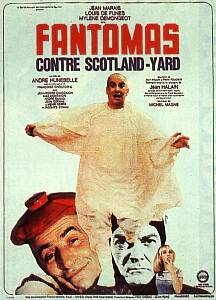Fantômas contre Scotland Yard
| Fantômas contre Scotland Yard | |
|---|---|
 Film poster | |
| Directed by | André Hunebelle |
| Written by | Pierre Souvestre (novels) Marcel Allain (novels) Jean Halain (adaptation, screenplay and dialogue) Pierre Foucaud (adaptation) |
| Produced by | Paul Cadéac Alain Poiré |
| Starring | Jean Marais Louis de Funès Mylène Demongeot |
| Music by | Michel Magne |
Production company | |
Release date |
|
Running time | 96 minutes |
| Country | France |
| Language | French |
Fantômas contre Scotland Yard (French pronunciation: [fɑ̃tomas kɔ̃tʁ skɔtland jaʁd], "Fantomas Against Scotland Yard") is the final installment of a trilogy of films starring Jean Marais as the arch villain with the same name opposite Louis de Funès as the earnest but outclassed commissaire Juve and the journalist Fandor, also played by Marais. The trilogy was France's humorous answer, starting in 1964, to the James Bond phenomenon that swept the world at around the same time.[1] The Fantômas films became extremely successful in Europe and USSR, and found success even in the United States and Japan where fan websites exist to this day.[2][3]
Plot
In the third and final episode of the trilogy, Fantômas imposes a head tax on the rich, threatening to kill those who do not comply. Journalist Fandor and commissaire Juve are invited to Scotland by Lord McRashley (played by Jean-Roger Caussimon). Lord McRashley, one of Fantômas' potential victims, uses his castle as the headquarters to set up a trap for the menace called Fantômas.
Cast
| Actor | Character |
|---|---|
| Jean Marais | Fantômas |
| Jean Marais | Fandor |
| Louis de Funès | Commissioner Juve |
| Mylène Demongeot | Hélène Gurn |
| Jean-Roger Caussimon | Lord McRashley |
Release
The film premiered in France on 16 March 1967.
The Fantômas trilogy
| Title | Release date |
|---|---|
| Fantômas | 4 November 1964 |
| Fantômas se déchaîne | 8 December 1965 |
| Fantômas contre Scotland Yard | 16 March 1967 |
References
- ^ Dimitris Eleftheriotis (25 January 2002). Popular Cinemas of Europe: Studies of Texts, Contexts and Frameworks. Bloomsbury Publishing. p. 84. ISBN 978-1-62356-955-6.
- ^ Japan fan website via the Internet Archive
- ^ Kate Ince (22 July 2005). Georges Franju. Manchester University Press. p. 55. ISBN 978-0-7190-6828-7.
